CBCI National Education Consultation, 12th Nov & 14th Nov 2018
Inaugural Session: Welcome and Felicitation and Report from the CBCI Education Office:
The national CBCI Education consultation was done by way of a full day Programme done in the course of two days. The first day’s (12th Nov 2018) programme was for 90 Regional and Diocesan Education Secretaries and the second day’s (14th Nov 2018) programme was for the National and Provincial Education Coordinators of Religious Congregations and it was attended by about 100 participants.
The Inaugural session started at 9.15 on 12th Nov/ 14th Nov at Don Bosco Provincial House, Okhla with a prayer led by Sr. Sherine, the Diocesan Education Secretary of Delhi Archdiocese / Dr. (Sr) Alphonse from Pondicherry. The inaugural session continued with the welcoming and felicitating of the Chairperson of the CBCI Office for Education and Culture Most Rev. Thomas D’Souza, Archbishop of Kolkata and the Member Bishops of the CBCI Office for Education Most Rev. Andrews Thazhath, Archbishop of Trissur and Archbishop John Moolachira, Archbishop of Guwahati (14th Nov) and Most Rev. Theodore Mascarenhas (12th Nov) the Secretary General CBCI and Auxiliary Bishop of Ranchi (12th Nov). Two other persons felicitated on stage were Rev. Bro T. Amalan, the President of the Conference of Religious in India (12th Nov) and Rev. Fr. Joy Jacob, Rector, Don Bosco Provincial House Okhla. Following the felicitations, the dignitaries on stage on being invited, lighted the lamp and inaugurated the day’s programme. 
Bishop Theodore Mascarenhas (12th Nov.) welcoming the Archbishops and all the participants, in his welcome address, spoke about the importance of the catholic education Policy and how it has been followed up and being implemented by the institutions and why there was a need for revision as the times and situations and government policies are changing. He also explained the scope and purpose of the “CBCI Education Masterminds” national quiz and how it was being launched and being executed with the help of Franciscan Solutions in close collaboration with the CBCI Education office. He complemented the work being done by the CBCI Education Office and commented on the various initiatives being undertaken by the CBCI Education Secretary in collaboration with the Regional and Diocesan Education Secretaries. He in conclusion appreciated the opening prayer high lighting the “raising of Lazarus” episode from the New Testament which in a way also highlighted the need for us to implore the miraculous and urgent intervention of Christ also in our own turbulent times.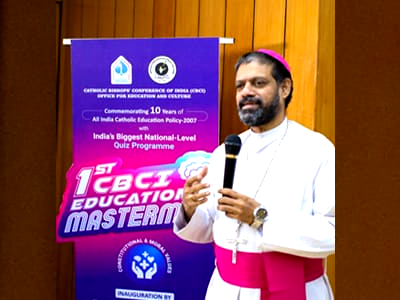
Archbishop John Moolachira (14th Nov.) after welcoming Archbishop Thomas D’Souza and all the South Asia Education Coordinators and National and Provincial Education Coordinators and others participating at the one day CBCI Education Consult, said that even in the face of the multiple pressures that all of us have while running our institutions, we need to focus our attention and works for the Catholic children, organize scholarships for needy children and keep alive our option for the poor. Next he led the participants to consider the qualities required for a Principal and imbibe the spirit of the Church, compassion for the needy and a heart for the poor. The need of the hour was to work in collaboration and adopt participatory management, continuously motivating the staff and training them and seek their full participation in the mission and full cooperation.
In the key-note address given by Archbishop Thomas D’Souza (12th Nov / 14th Nov) said that he would salute each one of the participants as people experienced and play pioneering roles in education with concern for the poor and the marginalized. He said that this meeting was about reflecting on Catholic education and on its mission of fulfilling the vision of Jesus, “that they may have life and have it in abundance”. He highlighted the salient and relevant features of the policy contained in the “All India Catholic Education Policy” and the importance of implementing them- namely: Provide quality and relevant education for all especially the poor; provide education that frees persons from the encumbrances of discrimination, illiteracy and whatever endangers life and respect and inculcate the values in life; promote respect for diversity and inclusiveness; provide education that humanises and allows all to play their rightful role in society, understand economic structures and political systems and promote transparency and accountability; impart education that energizes the young and promote nation building; impart education that shapes character, provides competence and promotes qualities of the heart; ensure promoting collaboration and cooperation and finally provide education that nurtures encounter with God and nourishes faith and teaches values. 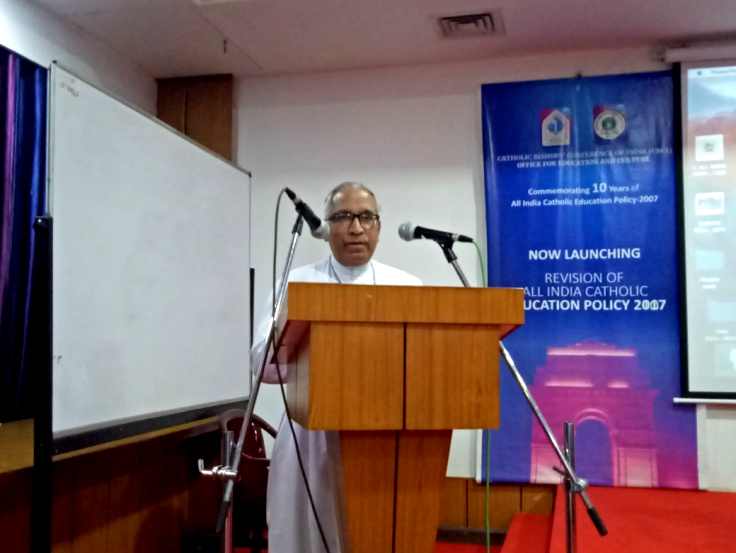
He further posed questions like whether we were projecting our schools as catholic schools and what makes it really Catholic? Are we really concerned about the poor? Are we nourishing the faith of the Catholic students? Are we really offering anything new and innovative to our students? Are our schools curriculum centred or child centred and whether we were reaching out to the neighbourhood.
He also touched upon the importance of all the Regional and Diocesan secretaries networking and collaborating together with the CBCI national office to carry out this important educative mission of the Church effectively. The Centre and the Regions need to work together and collaborate even as the regional problems are different from one state to another. CBCI Office for Education and Culture he said was at the service of all to help and promote in every possible way the mission of education. In conclusion, Archbishop Thomas complimented the good work being done by Fr. Joseph Manipadam, the Secretary, CBCI office for Education saying that he is gifted with both the qualities of the heart and hands which are very essential in carrying out our mission.
Archbishop Andrews Thazhath (12th Nov) in his message spoke at length regarding the importance of our minority rights and how we need to safeguard the same in the face of emerging challenges that threaten to undermine our minority rights in the face of the present political and social scenario. He cited some incidents and problems being faced and called for our united intent to work together to safeguard our rights and carry out our mission of education. He stressed on the importance of networking and fulfilling the mission of education effectively. He persuaded the participants to put in their full interest and work for a mission that was important in building the community and defending our faith and our rights as minorities. It is important that we implement whole heartedly the policy of the Catholic Church. He too complemented the works and initiatives being introduced by the CBCI Education office in revising the Policy and launching the national quiz programme. 
Fr. Joseph Manipadam, Secretary for the CBCI Office for Education gave a presentation reporting on some of the very latest concerns posed by the latest Government policy changes after which he gave a report on the work of evaluating and certifying the Catholic institutions across the country on the effectiveness of implementation of the “All India Catholic Education Policy” by each institution and the overall impact in each of the 14 regions through the graphic analysis that had been done. Some seven thousand institutions had already been evaluated and certified he said. Further he went on to announce the launching of the revision of the “All India Catholic Education Policy” as suggested by the Bishops at their previous Standing Committee and Plenary meetings. He ended his presentation with the inauguration of the “CBCI Education Mastermind”, a commemorative national quiz for schools across the country to celebrate the 10th anniversary of the “All India Catholic Education Policy” to create awareness and onward enthusiasm generating commitment to implement the Catholic Education Policy. The symbolic inauguration was done by Most Rev. Thomas D’Souza, the Chairman of the Education Commission in the presence of Archbishop Andrews Thazhath / Archbishop John Moolachira, Bishop Theodore Mascarenhas, Secretary General CBCI, Fr. J. Manipadam and the Quiz Master Aditya Nath Mubayi and representatives from the Franciscan Solutions, the executive partners in conducting the quiz.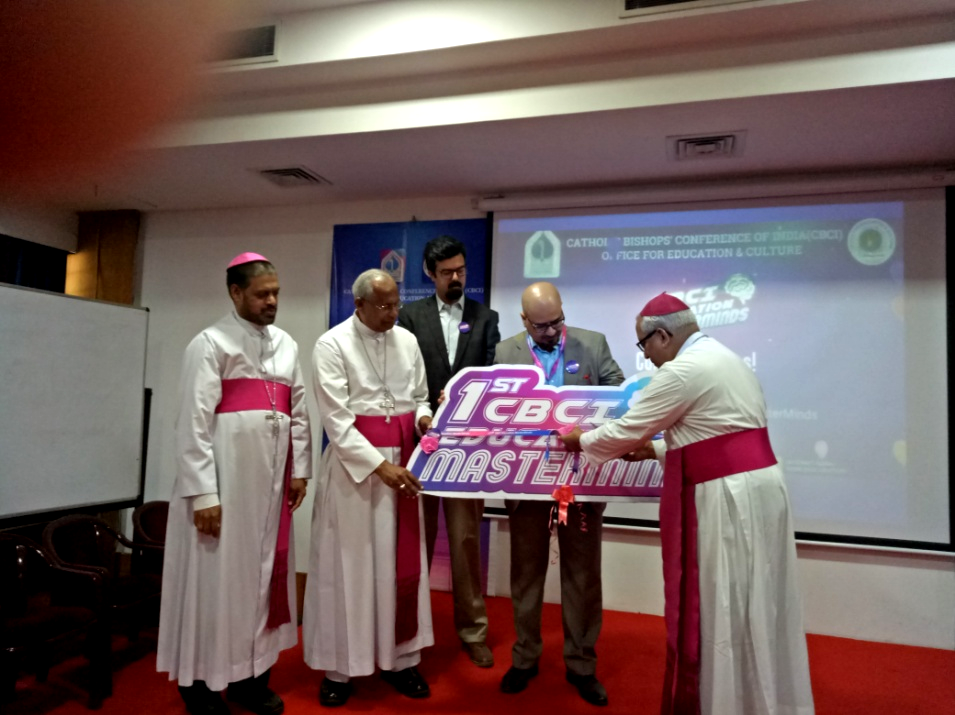
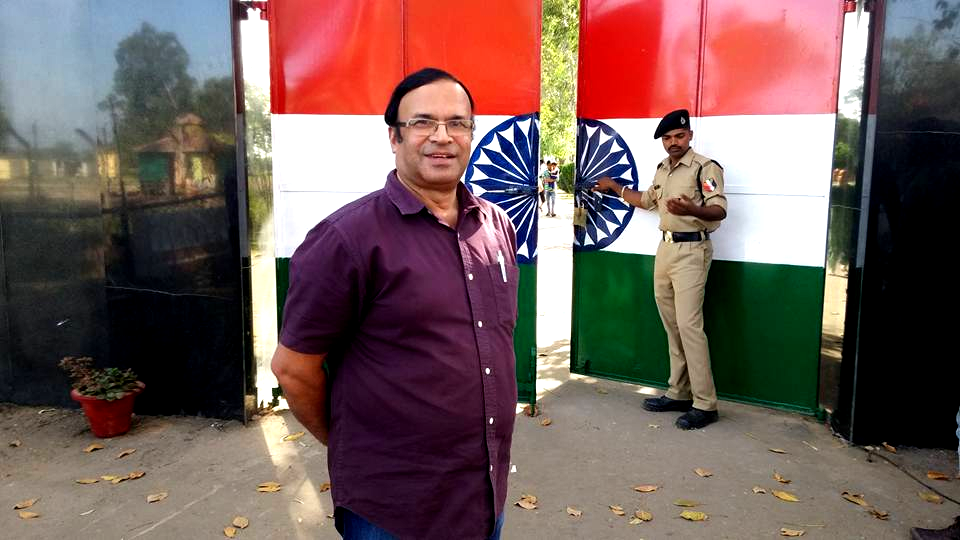
Second Session: Presentation from Bishop Charles Soreng, Padma Shri GeetaDharmarajan and Rev. Fr. A.S. Antonisamy:
Bishop Charles Soreng had been one of those involved in the drafting of the “All India Catholic Education Policy 2007” along with Archbishop Thomas Menamparambil, Archbishop Thomas D’Souza and other Member Bishops and Secretaries of the Education Office when Cardinal TelesphoreToppo was the President of the CBCI in the years 2005 – 2007. Bishop Charles Soreng who could not be present physically for the programme had sent his notes and remarks regarding “All India Catholic Education Policy and its significance which was presented by Rev. Fr. Joseph Raj, Regional Education Secretary of Bihar (12th Nov) / Sr Caroline Joseph Higher Education Counsellor, Holy Cross Colleges (14th Nov) in the absence. Bishop Charles Soreng was absent due to ill health. In his brief presentation Bishop Charles expressed concerns regarding admission of Catholic children in our schools, Understanding of Tribal Culture for effective education, cultivating an approach and spirituality of relationship, importance of career guidance and the 4 pillars of education for a holistic vision of education as proposed by the UNO. 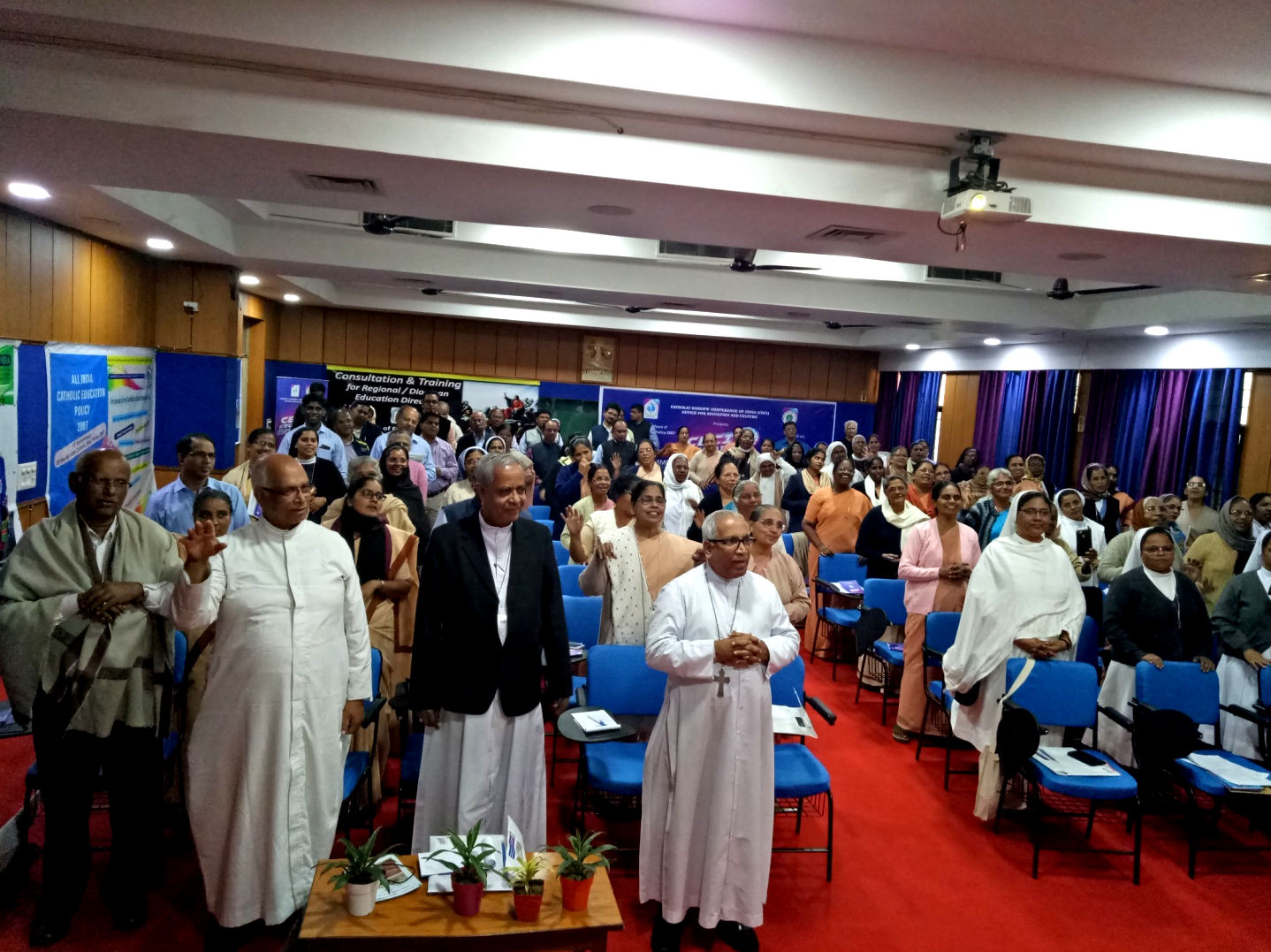
Padma Shri Geeta Dharmarajan’s presentation was on the use of Katha in imparting relevant education. Every child likes a story and longs to listen and tell stories. Katha method of teaching provides role models to the students and presents values in real life situations. Katha appeals to the imagination of the students and presents concrete heroes and characters and events to children. Education must start early and it is meant to prepare children for lifelong learning. This method makes children feel that they can be different and make a difference. The text books are the culprits that limit learning and use of all available materials and a special robotic lab would enhance the teaching by giving experiential learning to children. Of the 300 million children in schools 50% cannot read and write so they need special care and kindness. Gender equality and experiencing kindness and insisting on being active rather than just activity are taken care of in the use of Katha method of learning. The way the citizens are so will the Raja be… so Katha method of teaching influences children for better living and creates better citizenship. The method would be Listen, Speak, Story tell and special attention would be paid also to the play based training of teachers. She spoke about the necessity of cultivating in children the desire for truth, values and goodness. Katha seeks to enhance the habit of reading and makes a transfer from oral to reading tradition. The “Me”, “We” ideology is what is promoted by Katha in order to teach caring and sharing at a very early age. It is about pointing to the star and enabling children to travel towards it. Katha brings about attitudinal change and promotes critical thinking. The presentation was followed by a brief interactive session of clarifications being sought by participants and queries being answered and the Katha books being introduced to them.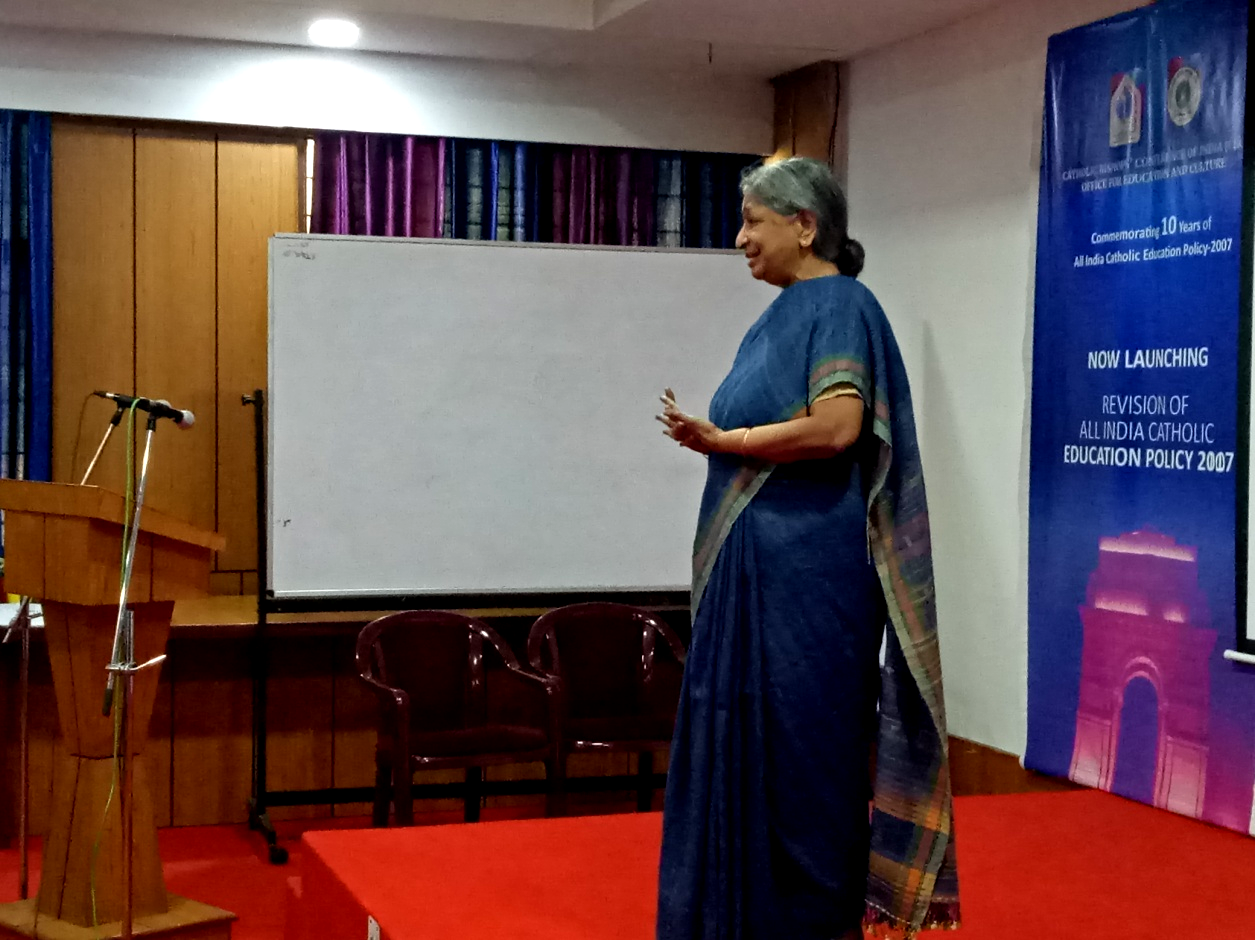
Fr. A.S. Antonisamy gave a presentation from a Pastor’s point of view on making education relevant and related to life and a life changing experience for all. He narrated how he himself had introduced this type of teaching in his past assignments as priest in different parishes and rural areas. Teaching values, teaching principles of life and the Bible through the use of various life related materials and flash cards etc. was dealt with. He had methodologies for teaching responsible citizenship, constitutional values, mutual help activities to initiate learning promoting self-help movements and campaigns etc. He was proposing an alternative education that is life oriented and geared to the teaching of virtues that affect the family and bringing about a change in the rural set up. He spoke of teaching values through drawing, painting and competitions. He spoke of smart goals in building human relationship and the importance of eye contact. He spoke about helping children to encounter God by giving priority to the word of God and its power by inculcating certain prayer habits accompanying the Bible reading. We should make children become friends of the Bible, Jesus and People (BJP). He also spoke about his campaign regarding systematic Voter Education to ensure 100% ethical election practices. We must have a heart to listen, see and speak. After his presentation some clarifications were sought by the participants. In doing this he had developed his own methodology which he shared through his power point presentation.

3rd Session: The need to depart from conventional education at the Primary and Pre-Primary; Participating in the “I CAN” Movement by DFC promoted by OIEC:
FR. Joseph Manipadam triggered thinking through three thought provoking video presentations: One a narration on “What is school for”, the second on “Montessori method of education” and the third on the harm that our Conventional education that presents answers instead of asking question, does to students. The need to come out of our conventional teaching in early education and impart scientific, activity oriented, play based education that promotes growth in an atmosphere of joy was a crying need in our Catholic schools he pointed out. The concern under consideration was the fact that most of our schools were slavishly succumbing to just extending conventional learning downward to the pre-primary and primary classes to the detriment to the mental growth and overall maturing of children.
Mrs.Payal Wahi, representing the Design for Change organization that had the mandate of promoting the “I CAN” movement, proposed and assigned to them by OIEC (International Office for Catholic Education) to carry forward the clarion call of “Laudato Si” of Pope Francis and the “Sustainable Development Goals, made her presentation. She explained the 4 step methodology of feel, Imagine, do, Share in planning and executing the various projects by children that thousands of schools were already participating in and explained how they were moving towards promoting the participation of 4000 children at the audience with the Holy Father and the 3 day’s camp at the Vatican in November 2019. She also explained the process of registering and participating in the “I CAN” movement and making children become agents of social change. Clarifications and question- answers followed the presentation done with the help of PPT and video clippings.
As a follow up of this session Fr. Joseph Manipadam who is also one of the Executive Council members from India at the OIEC (International Office of catholic Education) in Rome made announcement regarding the dates of the next OIEC international Conference in New York (4th to 8th June 2019), the mode of participation (10 from India only after the names were submitted through the Education Office of the Episcopal Conference and screened by OIEC within December this year etc) and the venue being Fordham University etc. and that this conference happens once in four years. He invited participation from the participating members representing regions or congregations. In India the Education Office of the CBCI is a member and AINACS is an Associate member of OIEC he clarified.
4th Session: Open House for planning and discussing the way forward:
This session was chaired by Archbishop Thomas D’Souza and Bishop Andrews Thazhath. Fr. J. Manipadam initiated the discussion by introducing the objective of the session as to how to move forward towards the revision of the Catholic Education Policy as it had already been ten years into its promulgation. He explained how the Policy evolved and was disseminated and implemented and the implementation was evaluated and institutions certified and how more than seven thousand institutions had participated in this process of evaluation and certification. So he proposed discussion as to whether there should be a revision; whether any change in the pattern of the policy would be thought of; the plan to hold consultations and whether there should be a drafting or collating committee etc.
In the proposals and suggestions that followed, the points that emerged were as follows (12th Nov):
There should not be a complete change but some adaptations required for the present situation can be incorporated. Revise it to meet the situation of the present day; Introduce a section of action plan in each chapter listing practical action plan after the policy statement in each chapter / section; as the present educational leadership is new and practically all heading institutions are not likely to have read through the policy, conduct a study regionally and then propose changes or action plans within a time limit; go in for a revision in order to study it and make suggestions and modifications; the revised plan should deal with different levels of education – primary- high school – college etc.; revise after getting feedback from also church hierarchy and superiors of religious orders; the revised policy should also deal with climate change, making education relevant and scientific, pocso, women’s safety at work place compliance etc.
On 14thNov., the suggestions that emerged from the open discussion were as follows: Concerns regarding gender discrimination, water, pollution, the 17 Sustainable Development Goals need to be addressed while revising the policy; Whether action plans should follow after each policy statement in each section had been discussed at the time of drafting the original policy and that suggestion had been put aside and the option had been for making a strictly policy statement and it was intended that action plans emerging from the policy be drawn up at the regional and congregational levels. Chapter 6 that talks about paradigm shifts had not been implemented; all should be involved in the process and changing situations and challenges should be taken into consideration while revision takes place; Matters regarding Catholic formation, relationship in the multi religious context, value education and concern for all people should be considered; Inclusive education should be stressed regarding Higher education and in order to make higher education effective knowledge and skill should education needs to be strengthened at the Primary education; there is need to move from management to animation... maintenance to mission mode... success to effectiveness....subject orientation to pupil orientation... me to we... performance to seeking.... conventional to critical.... knowledge to wisdom.; we need to go beyond seminars and General Body meetings; there is a need to set up a National Education Research cell at the national level.
So after considerable discussion, it was concluded that we would go in for region wise and congregation wise study of the present policy in view of introducing changes, modifications and adaptations that would be considered necessary within three months after a communication to that effect is issued from the CBCI Office for education. A drafting and compiling committee can be thought of if necessary after this process is over.
On request from the participants further clarification and explanation regarding the procedure of applying and participating in the proposed CBCI Education Master minds was given by Mr Vijay Singh explaining how it was conceived, its purpose, the way it is to be executed, the prizes offered, the dates of the quizzing events at the local, Regional and National levels etc.
FR. Eugene Lobo, the Regional Education Secretary was called upon to propose a vote of thanks on 12th Nov. While on 14th Nov. Both Fr. Manipadam as well as Archbishop Thomas D’Souza thanked everyone concerned for participating and making the Education Consult a very successful one after which the day’s programme was concluded with a prayer by Archbishop Thomas D’Souza.